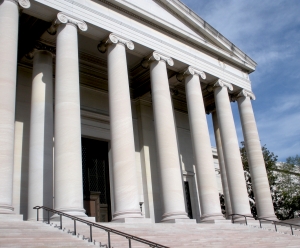

THE corporate/political campaign to change the patent system is gathering more steam. The Federal Circuit appeals court (CAFC), which we criticised before, is prepared to re-consider software patents; meanwhile we also learn that Google plays a role in asking for change:
The world’s largest search-engine company contends that too many other software patents hurt innovation more often than they lead to viable businesses. Google, along with JPMorgan Chase & Co. and the Yelp Inc. business-review site, say they need to be able to quickly resolve cases in which a patent owner sues a large number of companies over widely used software features.
An appeals court specializing in U.S. patent law will consider the issue tomorrow, in arguments about when software programs represent legitimate innovations and when they simply computerize ideas that couldn’t otherwise be patented. The question is important because challenging an invention’s eligibility for a patent can be quicker and cheaper than contesting a patent’s validity on other grounds.
U.S. companies shouldn’t be able to get patents on abstract ideas when they combine those ideas with a computer process, a lawyer argued in an appeals court Friday.
The U.S. Court of Appeals for the Federal Circuit should invalidate four patents held by electronic marketplace Alice because the process described in the patents can be done in a person’s head or with a paper and pencil, argued Mark Perry, a lawyer representing CLS Bank, which was sued by Alice for infringement.
Should an abstract idea written into software and run on a computer be patentable? That’s one question a U.S. appeals court will consider Friday when it hears arguments in a case with broad implications for software patents for companies as diverse as Google and Red Hat.
The U.S. Court of Appeals for the Federal Circuit is unlikely to invalidate all software patents in the CLS Bank v. Alice Corp. case, but it could force tech companies to narrow their claims when applying for software patents, some patent experts said.
A seemingly unassuming court hearing today could be the beginning of the end of software patents as we know them
Last year, we wrote about the next important lawsuit concerning software patents, the CLS Bank v. Alice case, which the full Federal Circuit appeals court (CAFC) heard today. Our last post on the case provided the background, but the short version was that it involves some software concerning doing a "shadow transaction" to see if there are really enough funds to complete a transaction, before completing the actual transaction. The district court found that this was just a representation of an abstract idea, and thus not patentable. CAFC, using a typical three judge panel, reversed that decision, saying that it was patentable subject matter. However, CAFC agreed to rehear "en banc" with the entire 10 judges, because there was some concern about the original ruling (which was split 2 against 1).
[...]
While Sachs was disappointed that there wasn't a clear attempt to define what constitutes an "abstract idea," I'm not as sure that's an issue. In fact, it almost seems oxymoronic to say that you need a strict definition of an abstract idea. The reason an idea is abstract is just that: it's abstract. But, at the same time, I can understand why patent lawyers would generally prefer a brightline, objective rule that can demarcate what is and what is not patentable. Either way, lots of patent lawyers will be waiting eagerly for this ruling.
A federal appeals court is set to consider a case closely watched by Google Inc, Facebook Inc and other technology companies that could determine how far the patent system should go in protecting software inventions.
The U.S. Court of Appeals for the Federal Circuit, which specializes in patent cases, will hear arguments on Friday over whether patents should be granted for business methods whose main innovation is that they require the use of a computer.